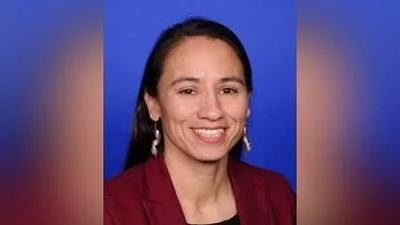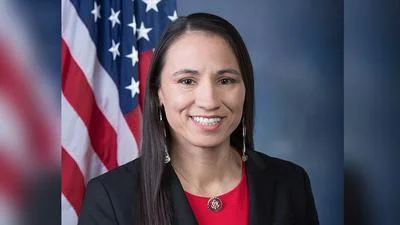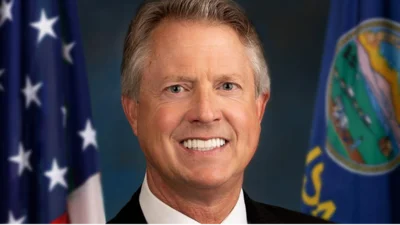The publication is reproduced in full below:
MOURNING THE PASSING OF FORMER CONGRESSMAN DENNIS MOORE
______
HON. SHARICE DAVIDS
of kansas
in the house of representatives
Tuesday, November 2, 2021
Ms. DAVIDS of Kansas. Madam Speaker, it is with profound sadness that I rise today to honor the memory of former Congressman Dennis Moore, who passed away November 2, 2021 at the age of 75. His long career in public service has left an extraordinary legacy that inspired many, including myself. My heart is with his family, his friends, and the community that he leaves behind.
As we mourn his loss, I'm reminded of the first time I met the Moores in person. I brought with me the pocket U.S. Constitution that I had carried with me all through law school--a pocket Constitution with an official label from the Office of Congressman Dennis Moore. After a good laugh about how on Earth I had managed to hold on to it all those years, he offered to sign my copy and gave me advice on my campaign. For his humor, his thoughtfulness, his dedication to public service
(and his guitar playing skills), he will be missed.
Dennis was born in Anthony, Kansas on November 8, 1945 and he attended high school in Wichita. He continued his education in Kansas and received his bachelors' degree in Lawrence at the University of Kansas and was awarded his J.D. from the Washburn University School of Law.
Even before serving as Congressman, Dennis demonstrated a lifelong commitment to service at a local and national level. He was a captain in the United States Army intelligence corps and served in the United States Army Reserve from 1970 to 1973. He also served as Johnson County District Attorney for over a decade. While he was District Attorney, he never lost a jury trial he argued and was instrumental in the founding of SafeHome, a refuge for battered women. In the late 90s, Dennis was elected to the Board of Trustees of Johnson County Community College.
In 1998, after more than two decades of service in other roles, Dennis threw his hat in the ring to serve the Third District of Kansas in Congress. Although the Third District had not elected a Democrat for over 40 years before that, Dennis won the election against a Republican incumbent with over 52 percent of the vote. Then he won again in 2000, becoming the first Democrat since 1914 to win reelection in the Third District of Kansas. For over a decade, Dennis served in Congress, known for civility and a strong presence in the communities he served. He retired from Congress in 2011 after completing his sixth term.
Dennis served as a Member of Congress during a uniquely fraught period between 1999 and 2011, during which Congress worked to respond to difficult national traumas such as the financial crisis of 2008. Even as Congress and the nation became increasingly polarized during this period, Dennis prioritized civility and bipartisanship to find solutions that would help average Americans. As Chair of the Oversight and Investigations Subcommittee on the House Financial Services Committee, Dennis held hearings on the impact of the 2008 financial crisis across the country. He also helped to produce the final version of the Dodd-Frank Act of 2010 to respond to the financial crisis and to help America recover.
Dennis had a traditional, common-sense approach to politics and worked hard to build consensus both within his party and across the aisle. When he first took office, Dennis was a member of a bipartisan group called the Center Aisle Caucus where Republicans and Democrats would come together at least once a month to improve cooperation and communication between the two parties. Within his party, he was a proud member of both the Blue Dog Coalition and the New Democrat Coalition, both of which focused on fiscal responsibility and promoting economic growth. Even though he was a pillar of centrism in Congress, he was never afraid to stand up for his values such as supporting women's reproductive rights and championing environmental activism at a time when climate denial was high.
During his tenure as Representative, Dennis sought common-sense solutions on a number of issues that impacted his constituents. These issues included but were not limited to delivering tax relief for middle class families, addressing global warming, and investing in local needs such as transportation, flood control infrastructure, and social services. Among his many accomplishments in Congress, Dennis said that he was most proud of leading successful efforts to improve benefits for our military during the wars in Iraq and Afghanistan.
After leaving Capitol Hill in 2012, Dennis continued to work as an advocate for causes close to his heart, such as increased funding for Alzheimer's research, education, and support. He came back to the Hill in 2014 to provide personal testimony on the burden that Alzheimer's can place on the health care system, families, and the federal budget. In that hearing, Dennis expressed a belief in a Congress that could come together and solve problems. ``I really think we need to find those areas where we can and should find agreement,'' he said. ``Good people on both sides work together, and there truly are good people on both sides.'' His optimism, practicality, and hope for bipartisanship were all trademarks of the leader that he was.
Madam Speaker, please join me in honoring the life of former Congressman Dennis Moore. Dennis was a dedicated, gracious, and principled leader who will be remembered for his service to the Third District and the state of Kansas. To say he left big shoes to fill is an understatement--he leaves a legacy of fighting tirelessly for what is good and right and decent for the people he represented.
____________________
SOURCE: Congressional Record Vol. 167, No. 192
The Congressional Record is a unique source of public documentation. It started in 1873, documenting nearly all the major and minor policies being discussed and debated.
House Representatives' salaries are historically higher than the median US income.




 Alerts Sign-up
Alerts Sign-up